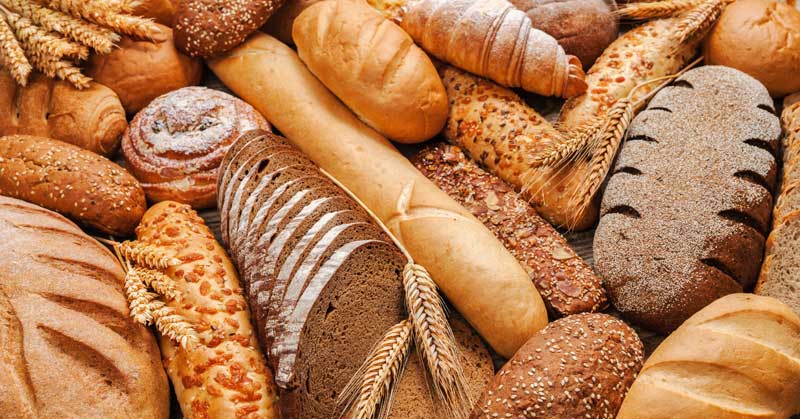[mashshare]

Gluten-free dieting has been all the rage in recent years, with an explosion of self-diagnosed gluten sensitivities sparking an interest in the gluten-free food market. Whether the motivation is soundly based in clinical diagnosis or purely an attempt at weight loss, the relief of common symptoms associated with the sensitivity has been attributed to the removal of gluten from the diet. Unfortunately, the information surrounding this complex molecule is largely misconstrued.
While gluten is often labeled as the culprit, there are other factors that can play a role in this sensitivity present in foods that contain gluten. Adopting a gluten-free diet inadvertently eliminates all of the potential culprits, and therefore provides relief. However, many important nutrients are stripped in the processing of these foods, and are often replaced with not-so-healthy substitutions and additives. The bottom line is that the research surrounding gluten sensitivity has been largely inconclusive and, although much of the media and books surrounding this topic can make a seemingly strong case, there is simply not enough evidence to support the assumptions made against gluten in the diet.
There are several related disorders that can cause nearly identical symptom presentations revolving around the irritation of the bowel. Celiac disease is an autoimmune disorder in which antibodies are made against particular proteins of the gluten molecule, resulting in an attack on the intestinal lining each time that gluten-containing foods are ingested. The prevalence of celiac disease is approximately 1% of the population, and can be confirmed with serological diagnostic testing for the causative antibodies. Endoscopic examination can also reveal villous atrophy along the small intestinal lining, as well as crypt hyperplasia, an overgrowth of the lining as a result of inflammation. Both of these presentations result in decreased nutrient absorption and can cause the well-known symptoms of irritable bowel syndrome (IBS), including bloating, irregular bowel movements, gas, and indigestion (Vazquez-Roque & Oxentenko, 2015).
A second similar reaction of the bowel occurs with a wheat allergy: an allergic reaction to the wheat component of foods, which often accompanies gluten. This is similar to how the body reacts to other food allergies such as peanut or soy, in that IgE antibodies make an acute attack on the “foreign invaders,” with the resulting IBS-like symptoms. Wheat is the most heavily cultivated agricultural product in the world and, with the amplification of turnover rate, increased pest-resistance, and nutrient-depletion of the soil, the structure of the wheat protein has altered over the last few decades. This has changed its macronutrient profile and immunogenic peptides, which may be causing the increasing prevalence of celiac disease and other sensitivities in our population (Fasano, Sapone, Zavallos, & Schuppan, 2015). The prevalence of wheat allergy is known to be quite low, accounting for only 0.1% of Western populations (Gaesser & Angadi, 2012).
The third disorder in this category is termed nonceliac gluten sensitivity, or NCGS. It has become the mainstream self-diagnosed form of IBS, by a largely unwarranted proportion of the general population. NCGS is somewhat ambiguous in scientific literature and clinical settings. It is, in fact, a sensitivity, as the name imparts. It is not a food intolerance, which is an entirely separate physical entity in which digestive enzymes are lacking for the support of proper digestion. As a result of a food intolerance, gut microbiota cause a fermentation of sugar in the colon, and the subsequent symptoms of indigestion follow.
NCGS develops as a result of the body’s innate immune response, which is a first-line defense mechanism against foreign molecules in the body, as opposed to the long-term adaptive immune response that occurs in celiac disease. When a foreign particle is ingested, the body reacts within hours to days with IBS-like symptoms. The good news is that innate immune responses are not long-lasting in the body, so with a short-term elimination diet and then a strategic introduction of the protein, a normal diet may potentially be resumed. However, there is not enough long-term research to confirm this with certainty.
Gluten has been labeled as the causative agent of NCGS; however, other dietary triggers such as fermentable oligosaccharides, disaccharides, monosaccharides, and polyols (FODMAPs), wheat, and amalase-trypsin inhibitors (natural-occurring wheat pesticides) have been implicated as potential suspects (Vazquez-Roque & Oxentenko, 2015). An elimination study was performed where participants with IBS-like symptoms were placed on a FODMAP-reduced diet for two weeks and then exposed to a randomized high-gluten, low-gluten, or no-gluten (control group) diet for one week, in order to delineate whether or not it was gluten or FODMAPs contributing to the symptomology (Vazquez-Roque & Oxentenko, 2015).
Gluten is often labelled the cause of nonceliac gluten sensitivity when FODMAPs are really to blame.
Gastrointestinal symptoms improved in all patients on the FODMAP-reduced diet and no symptoms returned upon exposure to gluten. In the large majority of gluten-free foods on the market, FODMAPs are also eliminated with the processing of gluten, and therefore the relief of symptoms is attributed to being “gluten”-free. Unfortunately, not all of the symptoms may completely disappear, since FODMAPs can appear in other foods. A thorough list of high- and low-FODMAP foods can be found here.
A review by El-Salhy, Hatlebakk, Gilja, & Hausken (2015) reported that, in a study on adults believing they suffered from NCGS, 24% had uncontrolled symptoms even after switching to a strictly gluten-free diet. In another double-blind, randomized study on females with IBS-like abdominal pain, symptoms subsided after the withdrawal of wheat products, not gluten itself (El-Salhy et al., 2015). When gluten-free diets are attempted without dietetic supervision, important nutrients such as fiber, vitamin A, magnesium, iron, and calcium can become deficient without supplementation (El-Salhy et al., 2015).
While gluten-free diets have been suggested for the treatment of autism spectrum disorders, there is no conclusive evidence supporting this claim, and the American Academy of Pediatrics does not support the use of gluten-free diets in these patients (Gaesser & Angadi, 2012). Celebrity endorsements of gluten-free dieting for weight loss have led to the overarching belief that these foods provide a healthier nutritional profile than traditional foods. The only population subset where BMI has improved following a gluten-free diet is in patients with clinically diagnosed celiac disease (Gaesser & Angadi, 2012). However, even in this population, individuals who started in the overweight or obese category actually gained weight as a result of this dietary change, potentially due to the increase in nutrient absorption as a result of the gluten-free diet (Gaesser & Angadi, 2012).
Many gluten-free foods possess higher caloric values and sugar content than their gluten-containing counterparts, and their lack of whole grains and fiber (both of which are inversely related to BMI) may negligibly or negatively impact attempts at weight loss (Gaesser & Angadi, 2012). Moreover, increasing whole-grain wheat intake has been shown to be beneficial for increasing healthy gut bacteria; so, if wheat and gluten can be tolerated, they should not be eliminated on the assumption of it being “healthier” when, in fact, there is no basis for this claim.
In individuals without celiac disease or true NCGS, gluten itself has been shown to improve lipid profiles in individuals with hyperlipidemia, reducing serum triglycerides by 13% after only two weeks of ingesting 60g/day (Gaesser & Angadi, 2012). High levels of wheat fiber and bran did not produce the same beneficial effect when gluten levels were kept the same (Gaesser & Angadi, 2012). Another study demonstrated the positive effect that gluten may have on reducing high blood pressure in affected adults. One of the target proteins of NCGS, gliadin, was reported to inhibit angiotensin I-converting enzyme (ACE), the common property of many synthetic hypertensive medications on the market (Gaesser & Angadi, 2012).
On another positive note, the immune-boosting potential of gluten has been attributed to the high glutamine content present in the protein (Gaesser & Angadi, 2012). In a study involving patients following surgery, subjects receiving wheat gluten hydrosylate for six days post-operation experienced a significant increase in natural killer cell activity from 6% to 57%. Natural killer cells are important in the monitoring of tumor development and viral infections, the latter of which is of high concern following a surgical operation (Gaesser & Angadi, 2012).
Gluten has some health benefits and shouldn’t be eliminated from a diet without medical guidance. Share on XTrue NCGS is a diagnosis of exclusion, after celiac disease and wheat allergy have been ruled out, and only with the elimination test followed by a gluten challenge for symptom recurrence. If no IBS-like symptoms appear with a gluten-free diet, even with the continuation of a FODMAP ingestion, then NCGS can be properly diagnosed and attributed to gluten. Statistics show that roughly 82% of individuals adopting a gluten-free diet do so without first seeking medical advice (Vazquez-Roque & Oxentenko, 2015). This can result in serious negative implications from both a physical and mental health capacity, due to the potential for malnutrition and insufficient adherence without professional medical guidance. Some clinical scientists are considering the possibility that NCGS is celiac disease in its earliest inchoate, clinical form, but much research is yet to be performed in this area. Clearly there are physiological and nutritional benefits to consuming gluten for otherwise healthy individuals, and so it would be negligent to eliminate this powerful protein without first acquiring the medical basis to do so.
Since you’re here…
…we have a small favor to ask. More people are reading SimpliFaster than ever, and each week we bring you compelling content from coaches, sport scientists, and physiotherapists who are devoted to building better athletes. Please take a moment to share the articles on social media, engage the authors with questions and comments below, and link to articles when appropriate if you have a blog or participate on forums of related topics. — SF
[mashshare]
References
- El-Salhy, M., Hatlebakk, J. G., Gilja, O. H., & Hausken, T. (2015). The relation between celiac disease, nonceliac gluten sensitivity and irritable bowel syndrome. Nutrition Journal, 14(1), 1-8.
- Fasano, A., Sapone, A., Zevallos, V., & Schuppan, D. (2015). Nonceliac gluten and wheat sensitivity. Gasteroenterology, 148, 1195-1204.
- Gaesser, G. A. & Angadi, S. S. (2012). Gluten-free diet: Imprudent dietary advice for the general population? Journal of the Academy of Nutrition and Dietetics, 112, 1330-1333.
- Vazquez-Roque, M. & Oxentenko, A. S. (2015). Nonceliac gluten sensitivity. Mayo Clinic Proc, 90(9), 1272-1277.



